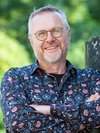How do our actions influence the Earth's climate system? What are the climate impacts for Germany? Where does our agriculture need to change? How can energy from the depths of the earth contribute to a secure heat supply? What does it feel like to do research in a cave? What makes hurricanes and tornadoes in space so dangerous?
Answers to all this and much more can be found
at the Long Night of Science
on the Potsdam Telegrafenberg
on Saturday, 17 June, from 5 p.m. to midnight.
The four institutes located here - AIP, AWI, GFZ and PIK - will be offering a variety of curiosities and interesting facts about space, earth and climate research - and about the energy transition in Germany.
Meetings with scientists, lectures and discussions, tours through unique laboratories and to historical instruments, diverse information stands and hands-on experiments invite you to visit. There is the chance to have interesting conversations with our researchers and to get rid of all your questions, in a relaxed atmosphere with live music and well provided with culinary delights.
There will also be fun and excitement for children at the "Smartest Night of the Year". Whether it's microscoping fossils, listening to a children's lecture on earthquakes or making pollen out of Play-Mais: Curiosity and participation ensure the research diploma.
Other highlights from the programme:
AIP - Leibniz Institute for Astrophysics Potsdam
- Experience the history of science up close: In the historic domed room of the Great Refractor, interested visitors can admire one of the largest refracting telescopes in the world.
- Solar research at the Einstein Tower: Find out how research was conducted on the sun's gravitational field in this architectural masterpiece.
AWI - Alfred Wegener Institute, Helmholtz Centre for Polar and Marine Research
- Detective work in the Arctic: learning about climate change from DNA - with DNA extraction from fruit
- 20 years of German-French Arctic research on Spitsbergen: the most interesting research projects can be seen again here
GFZ - Helmholtz Centre Potsdam - German Research Centre for Geosciences
- Discuss with experts on the topic: Fossil raw materials versus energy transition
- The Night Light Stage invites you to join in: Help to research light pollution and take measures against it!
- Insights into the new GeoBioLab: Microorganisms are the engineers of global material cycles. What do they look like? What is their significance in soils and sediments?
- If you'd like to try your hand at an "earthquake", the jumping seismics are just the thing for you.
- Digital globe - modelling the Earth in 4D: playfully explore how the Earth changes over short and long periods of time.
- Dendrochronology - precise tool for deciphering climate and environmental changes of the past?
PIK - Potsdam Institute for Climate Impact Research
- Why did the dinos die out? Together we will get to the bottom of this exciting story!
- The famous Michelson experiment: PIK shows a replica of the legendary experiment at the original location.
- Saving the world with soy cutlets: How are climate protection and nutrition connected?
- The red thread through the energy transition: Join us for a discussion on renewable energies and climate-neutral transport!
The complete programme from Telegrafenberg
- LNDW-Programme Telegrafenberg (German only)
- Detailed information on all the programme items is available on the LNDW website with the corresponding filter selected: www.langenachtderwissenschaften.de
- Or at the information stand in the evening.
- Music: Berlin trio "Muzet Royal" & solo artist Martin Milner


![[Translate to English:] Several hands touch a modelled landscape with "mountains" and "valleys". Contour lines and different colours depending on the altitude are projected onto it.](/fileadmin/_processed_/6/5/csm_Lange_Nacht_der_Wissenschaften_035-min_86fd0d10de.jpeg)

![[Translate to English:] Eine Frau mit weißem Kopftuch und ein Mann mit dunklen Haaren sitzen vor mehreren großen Computerbildschirmen mit Messdaten und Karten.](/fileadmin/_processed_/7/f/csm_20241221_PM-GITEWS_Abb0_Kachel_2b4cf3de2f.jpeg)







![[Translate to English:] [Translate to English:] Abror Gafurov von dem Schriftzug "Welcome to Azerbaijan" und den UN und COP Logos](/fileadmin/_processed_/2/5/csm_2024_11_Baku_COP29_Abror_Gafurov_1042faec82.jpeg)


![[Translate to English:] Martin Herold standing in front of the library on the Telegrafenberg](/fileadmin/_processed_/c/d/csm_Martin_Herold_d385ee4dd9.jpeg)
![[Translate to English:] Many people are listening to a presentation in the GFZ lecture hall.](/fileadmin/_processed_/c/a/csm_1_Bild1_hell_b9c0e9f5ed.jpeg)






![[Translate to English:] Both scientists sitting on stools in front of a wall of books in the Telegrafenberg library](/fileadmin/_processed_/6/6/csm_Buiter_Castell_DORA_4_e87cb1ea18.jpeg)
![[Translate to English:] Gruppenbild mit 4 Personen](/fileadmin/_processed_/8/d/csm_20241017_GFZ-Emmerman-Medal-005_web_reinhardtundsommer_21a414fa4a.jpeg)






![[Translate to English:] Ice landscape with five red tents](/fileadmin/_processed_/8/9/csm_Zeltlager_auf_dem_Eis_Urheberin_Jenine_McCutcheon_5ced2d523b.jpeg)

